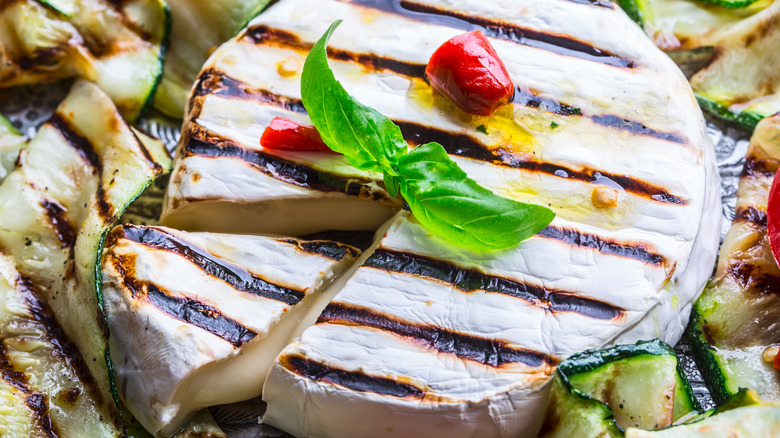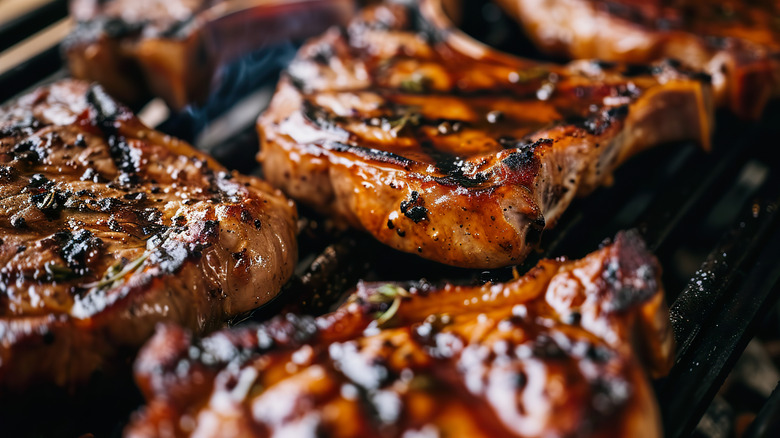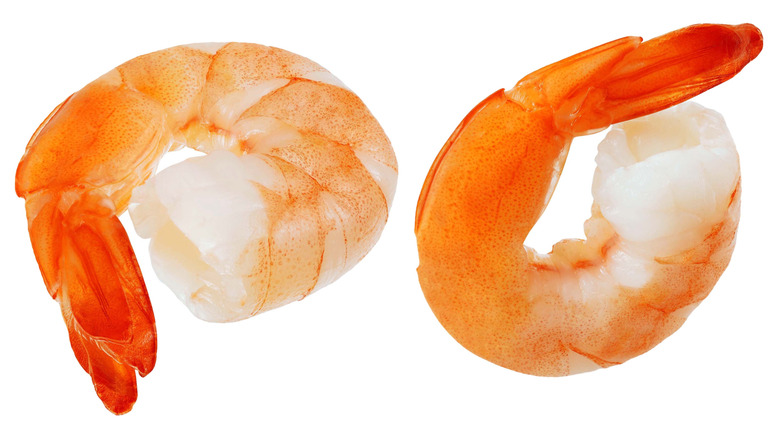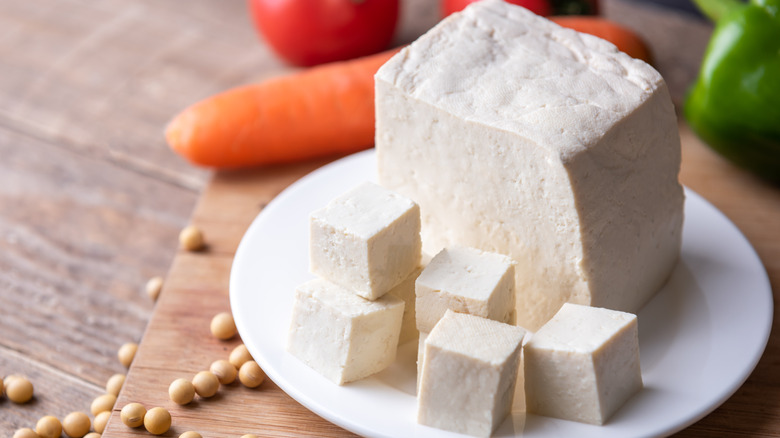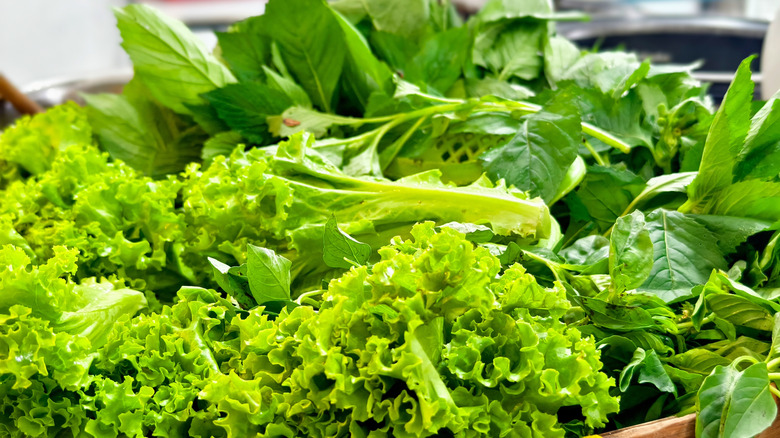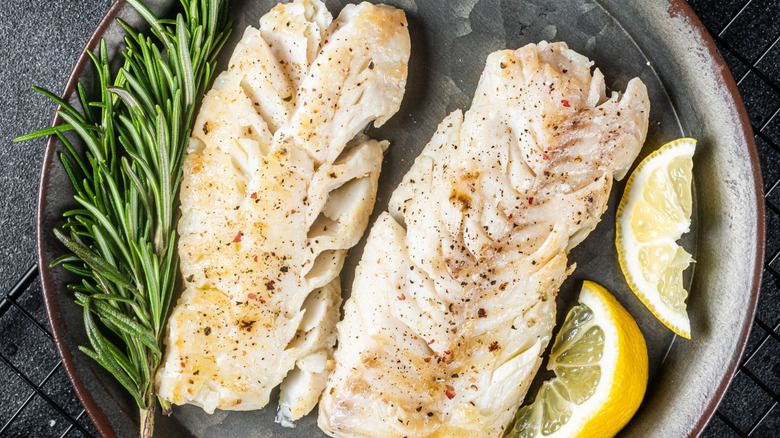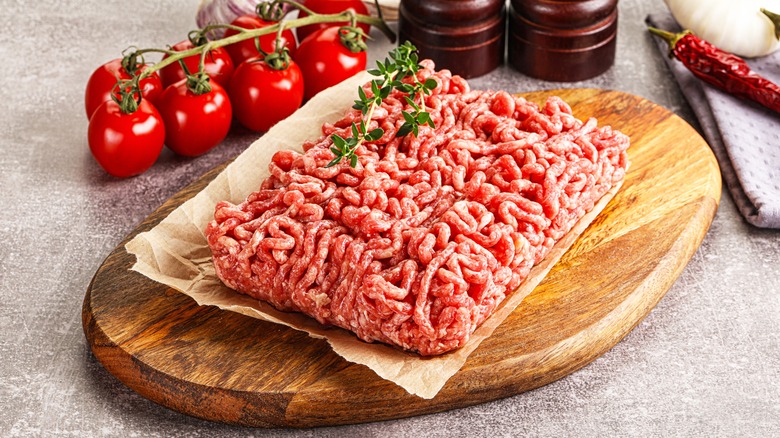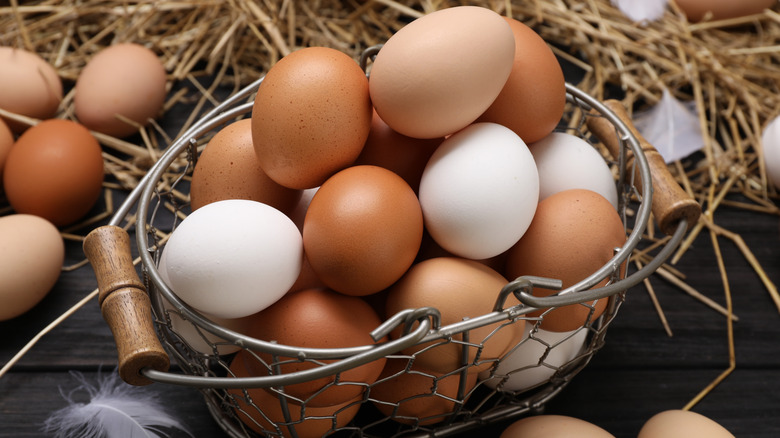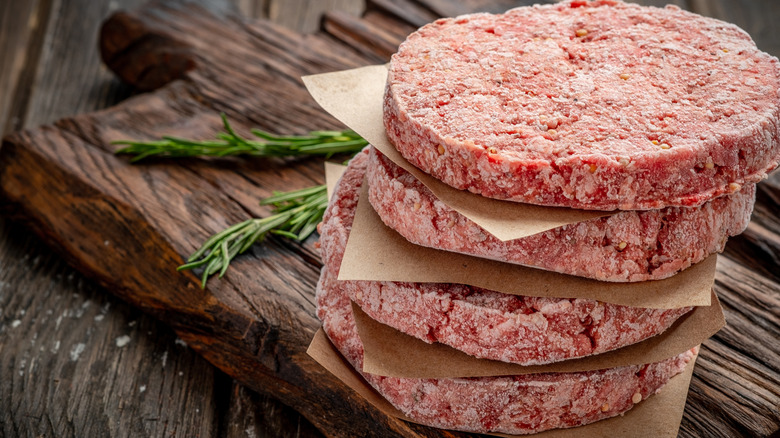10 Foods You Should Think Twice About Cooking On The Grill
There's nothing like grilling food on a warm summer night and eating it on your patio. Although it seems as if almost all food would taste better when cooked over an open fire, there are some things that you should think twice about cooking on the grill. A few types of food won't turn out well when placed on a grill due to several different factors. If an item has a high water content, for instance, it may dry out too much and become inedible, while delicate food is at risk of falling apart when placed on the fiery hot grill grates. Breaded pieces of food, such as meat cutlets, can also lose their structural integrity when grilled, and possibly even become a fire hazard.
There are several different methods for cooking food on a grill, including rotisserie-style, smoking, skewers, and foil packets. If a food item can't be placed directly on a hot grate, consider trying an alternative option if you still want the convenience of cooking on a grill and are craving that smoky flavor. If a piece of meat or produce doesn't have the right texture or moisture level for being cooked on a grill, it will most likely turn out too dry to enjoy and could possibly even be flavorless. The good news is that there are plenty of other foods out there that are perfect for searing or roasting over a hot, smoky fire. Here are a few foods that you may not want to bring to your next cookout, and some ideas for what you can bring to the party instead.
1. Pork chops
Although thick and hearty pork chops may seem like the ideal candidate to be grilled at first glance, you'll want to think again before adding the meat to your backyard barbecue. Even though pork chops are juicy and flavorful when cooked properly, they're lean cuts of meat and can easily dry out when cooked on a grill. Fattier types of meat, such as steak with substantial marbling or some types of ground beef, are much better options for grilling since they stay moist even when cooked over high heat. When it comes to grilling chicken, stick to dark meat like drumsticks or thighs, which have a higher fat content and more collagen, and avoid super-lean chicken breasts. No matter what type of meat you're grilling, look for cuts with generous marbling or a ring of fat, as most of it will melt away during the grilling process.
If you have your heart set on grilling pork, however, other cuts will work much better. Pork shoulder or butt will grill up juicy and delicious when smoked or roasted for a long time over low heat, while country-style ribs will sear to a perfect, golden brown over the open flame. Again, use low heat over a longer period of time for best results. Other cuts to consider grilling include spare ribs, baby back ribs, pork belly, and pork loin. To cook pork chops that you already have in your refrigerator or freezer, consider putting them in a slow cooker.
2. Peeled shrimp
There are several delicious ways to prepare fresh, peeled shrimp, but grilling isn't one of them. While grilling shrimp with the peel on results in a briny, sweet, and smoky explosion in your mouth, soft and delicate peeled crustaceans are likely to dry out quickly. Both peeled and unpeeled shrimp cook quickly no matter what type of cooking method you use, such as boiling or sauteing, but the high heat of a charcoal or gas grill will transform them from translucent to an opaque pink color in a minute or two. Grilling shrimp with the shells on will help lock in some of the natural moisture and bring out the sweetness. Grilled peel-on shrimp may not have an intense smoky flavor, though, as the shells will create a barrier.
If you still have a burning desire to cook your peeled shrimp on a grill, consider marinating it first to help infuse it with some much-needed moisture before putting it on the grates. Buy bottled seafood marinade, or whip one up yourself using boozy ingredients such as vodka or tequila. As another idea is to thread the marinated shrimp on a metal or water-soaked bamboo skewer before placing it on the grill. No matter how you prepare peeled or unpeeled shrimp over the flame, be careful not to overcook it, which could result in a dry, chewy texture. For an island-inspired touch, alternate the shrimp with pineapple, and soak the skewers in a rum-based marinade before grilling.
3. Tofu
For vegans and vegetarians, or carnivores who want to cut back on their meat consumption, tofu is a rich source of protein and other vitamins and minerals such as calcium and iron. Tofu, which is made from soybeans and formed into blocks similar to cheese, is perfect for cooking in a variety of ways, but grilling isn't on the list. No matter what type of tofu you're working with, including silken, soft, and firm, it doesn't contain any fat and will dry out quickly on the grate. All types of tofu contain a high moisture content — the blocks often come packed in water — and will break into pieces when placed over a flame. If you must grill tofu, stick with the extra-firm variety and avoid the silken type, as it has a soft, pudding-like texture.
If you have a block of tofu and are looking for the best ways to prepare it, you can't go wrong with throwing it into a skillet as part of a stir-fry or scramble. You can also bake it in a marinade or even throw it into your air fryer. Here's a recipe for easy crispy tofu when you're pressed for time in the kitchen. As an alternative meatless grilling option, stick with portobello mushrooms, zucchini, and teriyaki cauliflower steaks. There are also plenty of vegan and vegetarian hot dogs and hamburgers on the market.
4. Delicate leafy greens
Although it's easy to find Caesar salads made with charred romaine lettuce at high-end restaurants, especially during the summertime, grilling leafy greens at home may not turn out as mouthwatering. While some of the heartier greens, such as escarole, endive, bok choy, cabbage, and chard, may work on the grill due to their hard, sturdy cores and/or thick stems, more delicate varieties may not fare as well. If you have a craving to grill fresh, leafy greens this summer, stay away from the more delicate types, which include butter, red leaf, and green leaf lettuce, spinach, and radicchio. With their whisper-thin leaves and high water content, these greens will make much better bases for fresh garden salads.
If you do decide to go ahead and grill delicate greens anyway, use a grilling basket or foil pouches to keep them out of the direct heat. As another option, you can set a cast-iron pan on the grill grate, which will char the greens and give them a smoky flavor. Just be sure to turn the heat on the grill up to its highest level for 20 minutes before cooking the greens. They'll cook quickly, so don't leave them unattended during the grilling process, or you'll end up with a pile of burnt, wilted greens. Turn the leaves over halfway through to ensure they're evenly charred on both sides.
5. Flaky fish
Fresh-caught fish grilled to perfection is one of summer's many pleasures, but not all types are suitable for the searing hot grate. Most fish cooks very quickly when placed over an open flame, and can dry out just as fast if you aren't careful. While many types of meat tend to lose moisture at a rapid rate when placed on a grill, fish is the most precarious of them all. Fatty fish with firm flesh, such as salmon, tuna, and trout, are the best candidates for grill cooking, while types with a more delicate, flaky texture may end up falling apart and right through the grate. Flakier fish, including tilapia, cod, and halibut, may also stick to grill grates, creating a mess and ruining dinner. This is even more likely to happen if your grill isn't hot enough.
If you want to try grilling flaky fish or thin fillets, consider placing them in a grill basket or a foil packet first to avoid direct heat. If you go the foil route, you can add butter or a bit of oil to add much-needed moisture. It's also an excellent opportunity to season the fish, as you can add lemon, herbs, and spices to the packets. Brush the flaky fish fillets lightly with oil before grilling if you decide to place them directly on the grate without any protection. Leaving the skin on the fish may also help, as it provides a natural heat barrier. You can also prevent fish from sticking to the grill by coating it with oil.
6. Tomatoes
Ripe, juicy, garden-fresh tomatoes and grills are among summer's many joys, but they don't really play that well together. While you can grill many different types of juicy produce, such as watermelon and peaches, tomatoes tend to be too delicate to stand up to the fiery grates. It's easy to find recipes for grilled tomatoes, but most recommend using tomatoes with heartier flesh for the best results. If your tomatoes are too ripe and soft, they may split and pop when placed on the grill, and some might even completely collapse, creating a mushy mess. For those set on grilling their tomatoes, go with semi-firm ones, such as the Roma or heirloom varieties. If you're grilling them directly on the grate, be sure to brush them with olive oil or marinade first.
As another option, you can place less-firm tomatoes into foil packets prior to grilling them, which will help prevent them from losing their delicious juice. Fill the packets with fresh herbs such as oregano and basil, and serve them over crostini or in sandwiches as a summer treat. They'll also make a creative pizza topping, and would work especially well with fresh mozzarella. You can also set sliced tomatoes in a cast-iron grill pan directly on the grate as another idea. Also, many other types of vegetables, including carrots, sweet potatoes, peppers, and corn on the cob, cook to perfection on a grill if you don't mind thinking outside of the tomato.
7. Soft cheese
There's grilled cheese, which we all know and love as melty, crispy sandwiches, and then there is actual grilled cheese. The latter description refers to pieces of cheese placed directly on a grill grate for a smoky, decadent treat. When it comes to grilling chunks of cheese, however, not all types will fare well when placed on searing hot grates. Some softer varieties, such as brie, Monterey Jack, and havarti, will become gooey, melty messes that easily slip through the grill grates due to weaker protein networks and looser emulsions. When you choose cheeses that are specially made for use on the grill, or those with a higher melting point, such as paneer, halloumi, and queso panela, they won't lose their texture.
Some mild, creamy cheeses can stand up to the heat, as long as they are contained within a substantial rind. These types can be placed directly on the grill and won't stick or melt down, resulting in a creamy, melty spreadable topping for bread and crackers. Specialty semi-soft grilling cheeses, such as Rougette, come in an olive oil and herb marinade and are designed to be grilled in an aluminum pan. If you still want to try grilling a softer cheese with a lower melting point, wrap it in foil or place it in a grill pan to enjoy fondue-style.
8. Extra-lean ground beef
Making your hamburgers using extra-lean ground beef may sound like the right thing to do for your health, but it's a no-no when it comes to grilling. Just like other types of grilled meat, such as steak and spare ribs, the fattier the better. Hamburgers made with a 90/10 ground beef blend, which contain 90% meat and 10% fat, may lose moisture quickly when subjected to high heat, resulting in a dry, crumbly texture. Instead of a juicy, tender patty, you'll have a hockey puck in your bun. When it comes to making hamburgers for the grill, stick with a 80/20 ground beef blend for the best result.
If you only have lean ground beef on hand and are hosting a backyard barbecue in a few hours, there are a few ways to add some much-needed moisture. As one option, add a bit of olive oil to the beef before forming it into patties. You can also mix in some grated cheese or diced onions, which will also infuse the hamburgers with flavor. Making thinner patties or topping them with melty cheese slices may also help. There's also a hack for perfectly moist grilled burgers hidden in your freezer.
9. Whole eggs
Grilling whole eggs may sound like the latest gourmet food fad, but the result is often less-than-favorable. When this grilling hack is done perfectly, the eggs come out with a desirable soft yolk with a hint of smoky flavor, similar to bacon. The flavor combination is a match made in heaven, but if you don't cook the eggs properly, you'll be left with a mess rather than a delicious breakfast. Even if you follow the egg-grilling rules, some may end up popping and bursting if internal pressure within the shell builds up too quickly. Also, the key to perfectly cooked whole eggs is an even temperature throughout, which is why the boiling method works so well. When you place whole eggs on the grill, they may cook unevenly, causing some of the whites to become rubbery, while others are runny.
If you're camping and want eggs for breakfast, opt for cracking them into an oiled skillet that you'll place directly on the grill grate. Another option is cracking individual eggs into a muffin tin that you can also set on the grate. Both methods will allow the eggs to cook uniformly with an even temperature throughout. You can also get creative by sprinkling shredded cheese, diced onions, green peppers, and tomatoes in with the eggs. This technique works best on a grill set to medium-high heat.
10. Frozen burgers
Your grill is fired up, and outdoor party guests are starting to arrive, but you just discovered that the burger patties are frozen solid in your freezer. Should you throw them on the hot grates anyway? The answer is no, for several reasons. When you're in a hurry to defrost meat in a situation like this, here are the dos and don'ts for thawing it in a microwave. While it might be tempting to just go ahead and put frozen food on the grill, you may end up ruining perfectly good summer barbecue ingredients. For best results, the hamburger patties should be at room temperature before going on the grill, similar to steak, to make sure they cook evenly throughout. If you grill frozen patties, they'll end up being charred on the outside and still cold on the inside. The thicker the patty, the bigger the issue will be.
While grilling hamburgers from a frozen state is perfectly safe, as long as the meat has been properly stored and handled, the texture may be off. This is because when frozen patties are placed on the hot grill, they may start to steam, rather than sear, depriving the burgers of that sought-after crust. When you use thawed ground beef, you'll end up with a juicy burger that is perfectly browned.
